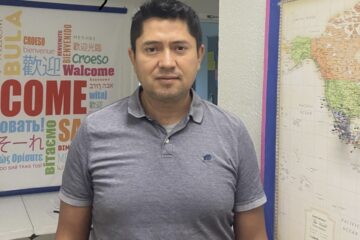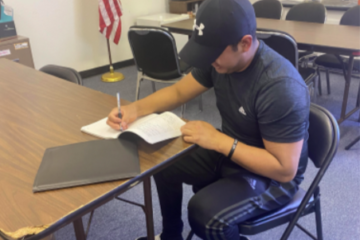Immigrant Stories: Nara Vera
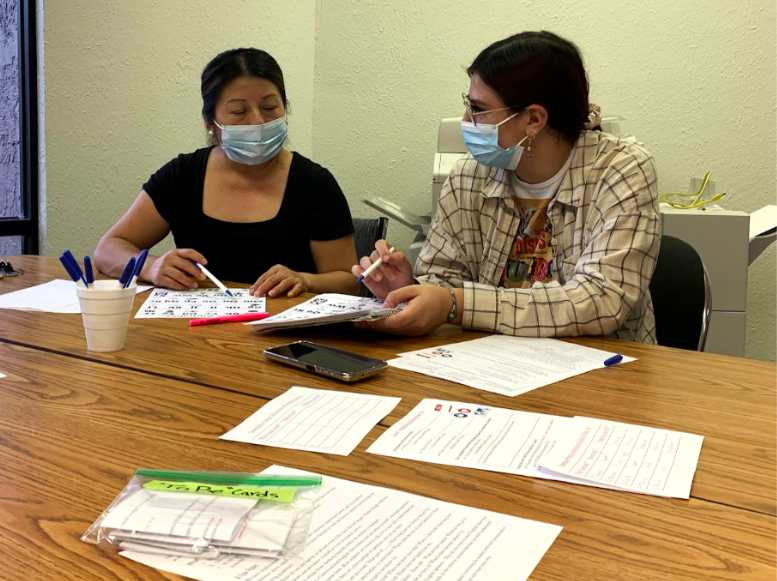
Every Wednesday night, student Nara Vera is the first to arrive at the Conversational English classes offered at BIIN. She’s always ready to learn with a notebook full of last week’s worksheets and a new set of brightly-painted nails. Nara has never missed a class, and is the first to answer questions and help her classmates.
“That’s the way my dad raised me,” Nara said. “He was always super hardworking, and I learned a lot from him. When I work, I try to do my job to the best of my ability, and my studies as well. I always prioritize those things—my work and my studies, which is what helps me to keep going and to become independent here in the United States.”
 Nara arrived in the United States in March 2022, only intending to stay with family for a couple of months before returning home to Santa Fe, Argentina. Since then, her boss at the restaurant Los Cucos promoted her to manager, she obtained her driver’s license and began the process of buying her own apartment, all while finding time to attend BIIN’s summer English classes, every week.
Nara arrived in the United States in March 2022, only intending to stay with family for a couple of months before returning home to Santa Fe, Argentina. Since then, her boss at the restaurant Los Cucos promoted her to manager, she obtained her driver’s license and began the process of buying her own apartment, all while finding time to attend BIIN’s summer English classes, every week.
“I wanted a change, I wanted to see what my life could be like [outside of Argentina],” she said. “I wanted to experience what it was like to live in another country, with other people, and to get to know new things. More than anything, I wanted to get to know where I was born, because I don’t remember.”
Nara, now 21 years old, was born in Louisiana in 2001. Her parents had moved there from Santa Fe, Argentina, in 2000 to work—her father in a furniture factory and hotel, her mom as a waitress. In 2002, when Nara was too young to remember anything about Louisiana, she and her mom returned to Santa Fe to be closer to family.
“That’s why I don’t speak English,” she joked.
Nara completed primary and secondary school in Argentina, receiving a year of English instruction before starting to work full-time. In Argentina, she said, “You have to work to live day-to-day.”
“Since there wasn’t work available,” she said, “my parents offered to help me open my own pet shop, to make something of my own.”
At only 19 years old, in March 2021, Nara became the owner of “Pet Shop Milo,” named after her dog. Soon, her product base expanded from just pet supplies to “a bit of everything.”
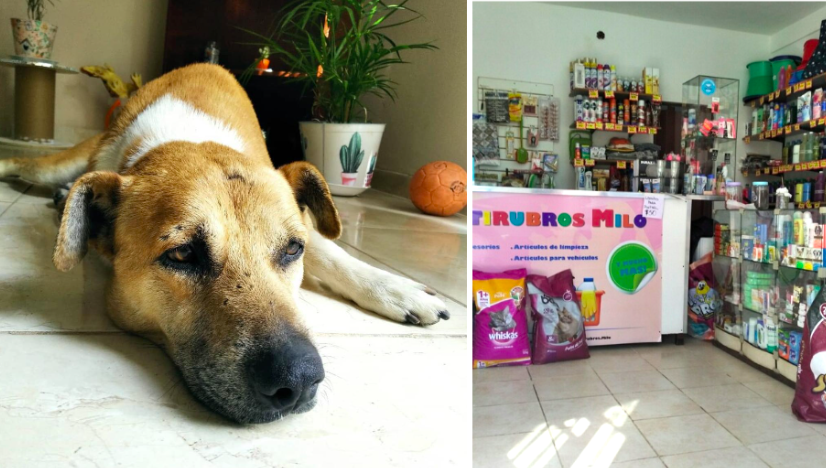
“A bit for the house, a bit for cleaning, a bit for pets,” Nara said. “I had all sorts of miscellaneous items.” Accordingly, she changed the name to “Multirubros Milo,” meaning “Many-items Milo.”
Despite her hard work six days a week, Argentina’s economic inflation made owning a small business a struggle. Nara closed her store before moving to College Station, where she now works as a hostess and soon-to-be manager at Los Cucos restaurant.
“The other day, I worked two hours and [earned enough that] I could buy a hair curler, a blow dryer, or a straightener to do my hair,” she said. “[In Argentina], I had to work almost two, three weeks to buy the same thing.”
Six days a week, Nara works six to 12-hour shifts for a total of 55 hours a week. In her free time, she likes to explore the city, and to do her hair, makeup, and nails. She also sets aside time to learn English, having adjusted her schedule to ensure that she could attend evening classes.
“The ability to communicate with people is what motivates me,” she said. “That’s what I want, because I feel bad when my co-workers speak to me in English and [I don’t understand]. I want to be able to depend on myself. A lot of times, I don’t go to certain places or I get scared asking for things, because I don’t know how to explain myself in English.”
Coming to the U.S., Nara said she already had a “base” of English from her studies in Argentina.
“I thought it best to learn English here from ‘zero,’ because I didn’t know if it would be the same English that they taught me in Argentina,” Nara said. “I preferred to start [learning from the very beginning] again, although I knew that I understood certain things.”
She and her aunt, a College Station resident, found Brazos Immigration’s classes through a Google search.
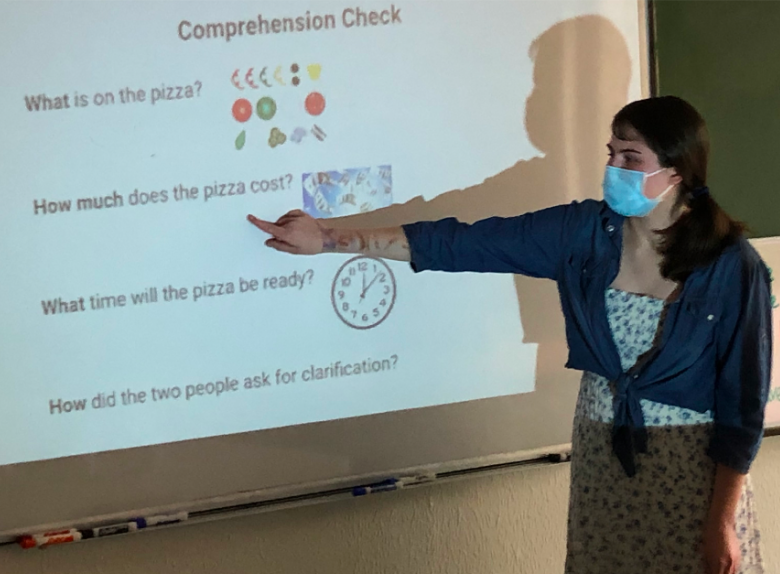
“Honestly, [the classes] helped me a lot. I feel more confident. I tend to understand things more than I used to,” Nara said. “For example, after doing the classes, I can better understand when I answer the phone at work.”
At Los Cucos, Nara answers the phone to make reservations and take to-go orders of chips and queso, large quesadillas and sweet tea. She said BIIN’s classes helped her “lose [her] fear when answering the phone.”
Recalling her first few weeks on the job, Nara said, “[When] I heard the sound of the phone ringing, it made me panic, like, ‘What do I do, what do I do, what do I do?’ Before, I answered the phone and didn’t understand people. Now, I understand more of what they tell me. And for me, that’s an achievement, because I couldn’t do that before.”
Her job requires that she use English in several ways —greeting people, recording numbers, times, and prices, asking questions, and repeating and clarifying information—all skills that Nara diligently studied in class.
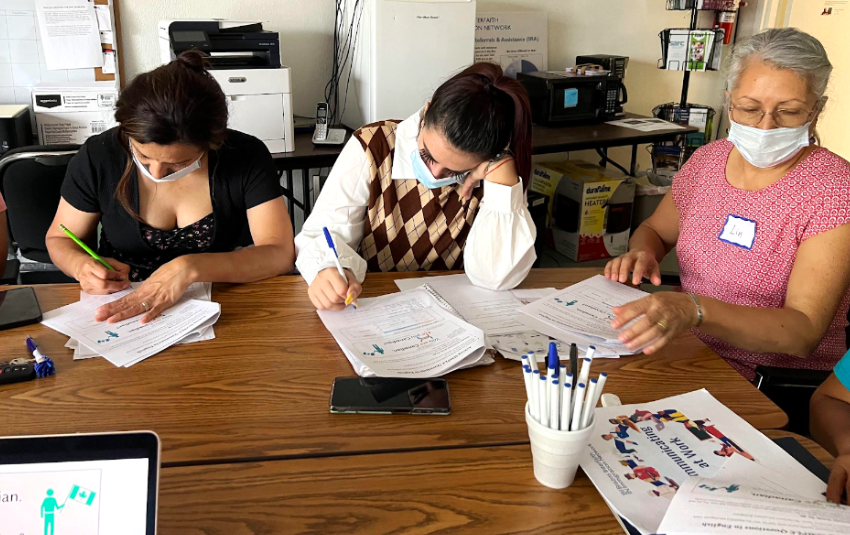
“I annotate and save all of the papers we get during class,” she said. “I fill them out again after class. I read them. If I still have a lot of questions, I read everything again, and that helps me to always keep moving forward a little more with English.” She takes note of any questions she has to ask volunteers, who she said especially help her with pronunciation.
Moving forward, Nara is seeking more English courses in the Brazos Valley so that she can add more days of study to her schedule. She sees learning English as an essential part of becoming independent in the United States.
“My dad raised me to know that I can achieve anything that I want, and that’s what motivates me a lot, to be able to get the things I want by my own merit, including speaking English.”
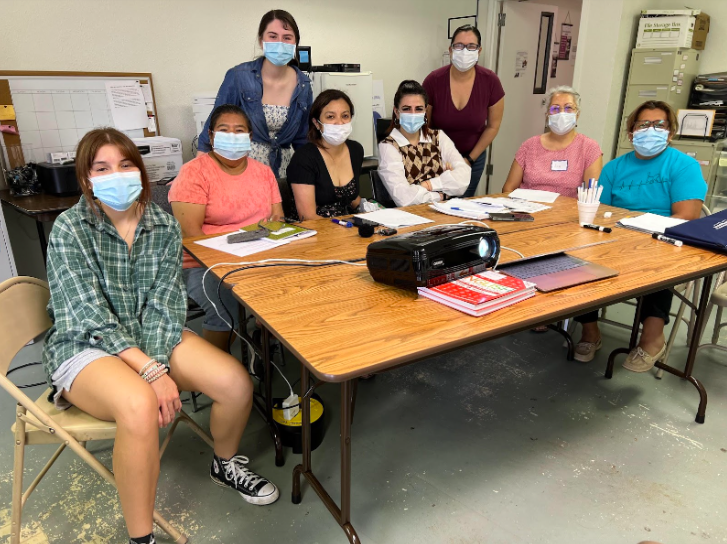
Thanks to summer 2022 intern Elisabeth Stewart for working with Nara to craft this profile and for planning and leading classes that engaged everyone in this community of learners.

